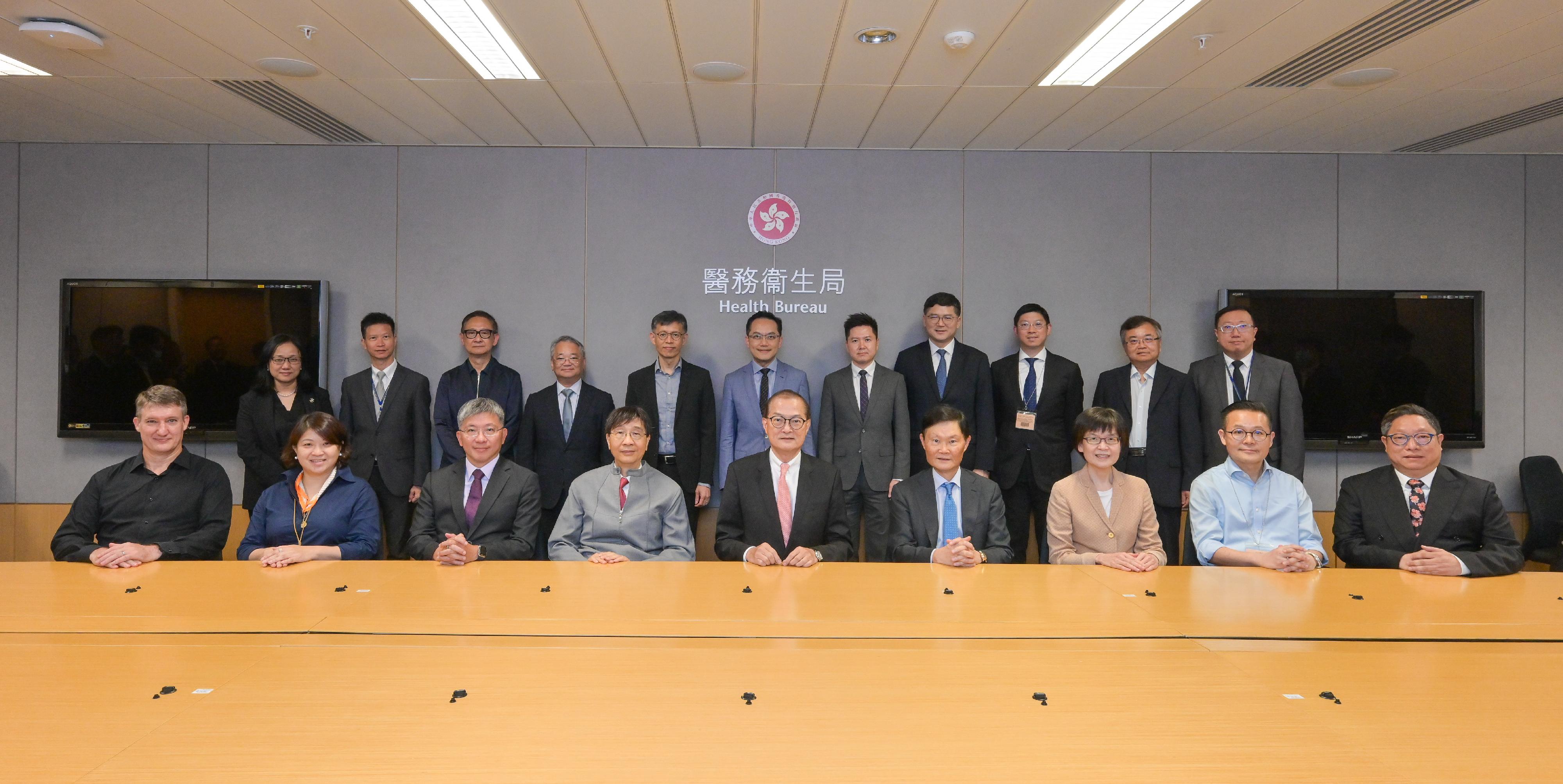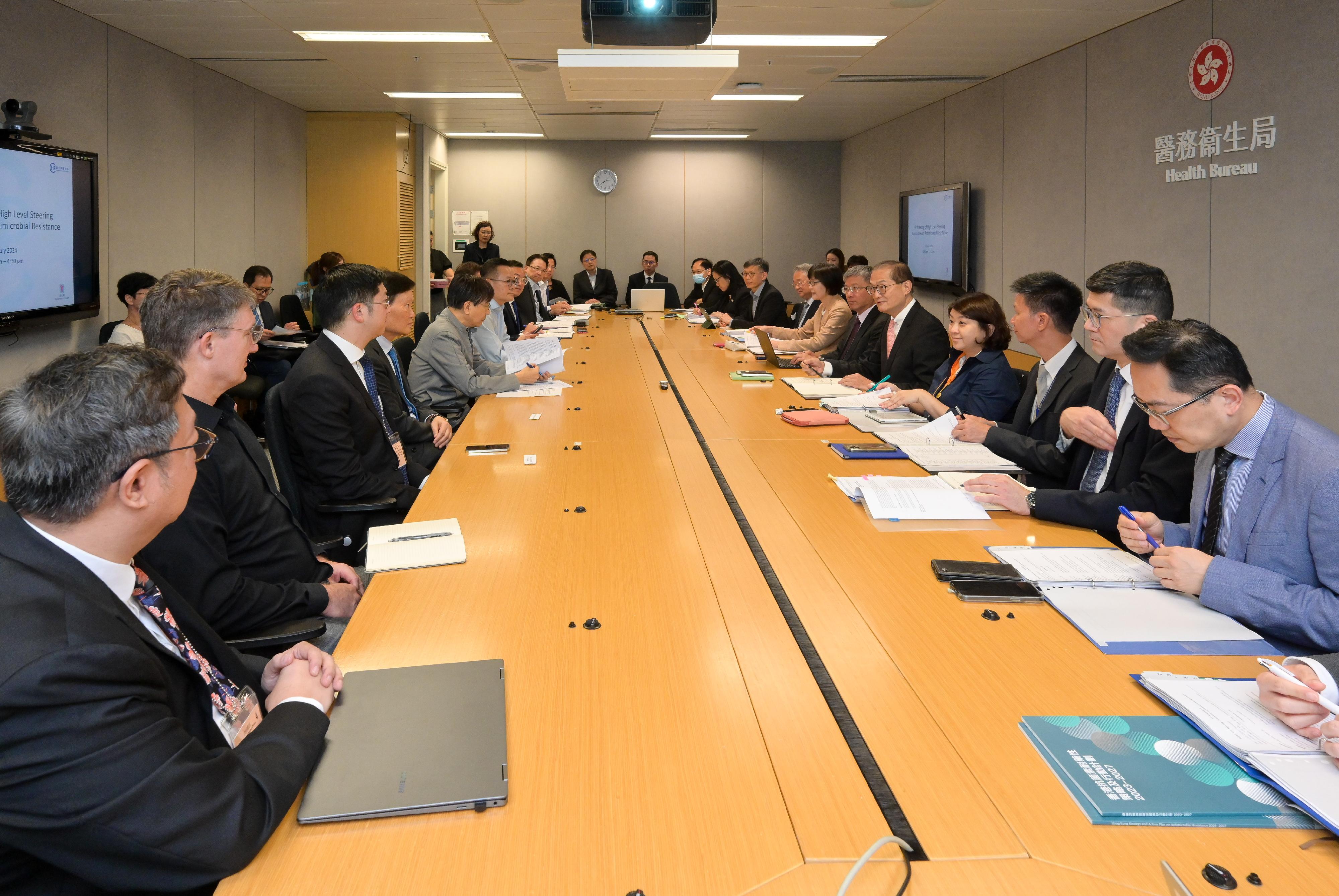Secretary for Health chairs ninth meeting of High Level Steering Committee on Antimicrobial Resistance (with photos)
The Secretary for Health, Professor Lo Chung-mau, convened the ninth meeting of the High Level Steering Committee on Antimicrobial Resistance (AMR) today (July 11) to review the implementation of the Hong Kong Strategy and Action Plan on Antimicrobial Resistance (2023-2027) and discuss the response strategies with relevant government departments and organisations.
Professor Lo said, "AMR is considered as one of the greatest threats to global health and economies. In this connection, the Government has long been attaching great importance to the necessity of tackling the issue of AMR. As inter-sectoral collaboration and communication across the community are crucial to mitigating such a threat, the Government has been rallying cross-sectoral co-ordination and co-operation of relevant government departments as well as organisations under the 'One Health' framework to implement various aspects of the Action Plan over the past few years."
Based on the initiatives laid down in the Action Plan, a series of actions against AMR have been taken. These include considering legislative amendments to mandate the recording of antimicrobial prescriptions and dispensing through electronic means, making use of information technology to strengthen antibiotic stewardship in public hospitals, enhancing surveillance and dissemination of AMR data in ready-to-eat food, implementing the "veterinary prescription-only medication supply" policy in local food animal farms, organising publicity campaigns to raise public awareness of the threat of AMR, and strengthening collaboration and partnerships among different stakeholders.
At today's meeting, the Steering Committee reviewed the progress of the actions taken according to the Action Plan and evaluated the latest local situation of AMR by analysing the relevant surveillance data from various sectors, namely human, animal and food. The data thereof showed that the wholesale supply of antimicrobials to community pharmacies continually dropped from 18.5 per cent in 2016 to 4.1 per cent last year. Moreover, out of the total antimicrobial supply in Hong Kong, the proportion of the antimicrobials under the "Access" classification of the World Health Organization (WHO) (i.e. those less likely to result in resistance) reached 60.2 per cent last year, thus achieving the target as advocated by the WHO.
The Hospital Authority (HA) has been promoting the prudent use of antimicrobials through its Antibiotic Stewardship Programme (ASP), playing a crucial role in the fight against AMR. The HA introduced an electronic platform known as "Smart ASP" this year to leverage data analytics to assess the appropriateness of antibiotic prescriptions. The platform also prompts clinicians to review prescriptions if necessary. Furthermore, the HA closely monitors antibiotic consumption trends and AMR patterns. Among all, Methicillin-resistant Staphylococcus aureus (MRSA) and Carbapenem-resistant Acinetobacter (CRA) showed a notable reduction by 3.0 and 8.9 percentage points respectively in 2023 compared with 2022. The HA remains committed to enhancing infection control measures and conducting routine audits to safeguard patient safety and combat AMR.
In terms of food safety, the Centre for Food Safety (CFS) of the Food and Environmental Hygiene Department reminds the food trade and the public that raw or undercooked food is high-risk as it may carry bacteria with AMR. High-risk individuals, such as pregnant women, young children, the elderly, and persons with weakened immune systems (e.g. patients with chronic diseases), should avoid consuming raw or undercooked food whenever possible. The CFS highlights that the most effective way to reduce bacteria with AMR in food is to observe the Five Keys to Food Safety in daily life, namely choose safe raw materials, keep hands and utensils clean, separate raw and cooked food, cook thoroughly, and keep food at safe temperatures.
The Government calls on different sectors to continue working closely together to cope with the challenges brought about by AMR. Healthcare professionals should follow the guidelines on the prudent use of antimicrobials, while patients should strictly adhere to doctors' instructions when taking antimicrobials and should not buy antimicrobials on their own at community pharmacies without a prescription.
For details on information about AMR, members of the public may visit the thematic website of the Centre for Health Protection of the Department of Health.
Chaired by the Secretary for Health, the Steering Committee was set up in May 2016 to encourage collaboration, synergy and cross-fertilisation among all professional sectors to jointly cope with the problems of AMR under the "One Health" framework. The Steering Committee comprises representatives from relevant government departments, public and private hospitals, healthcare organisations, academia and relevant professional bodies.

